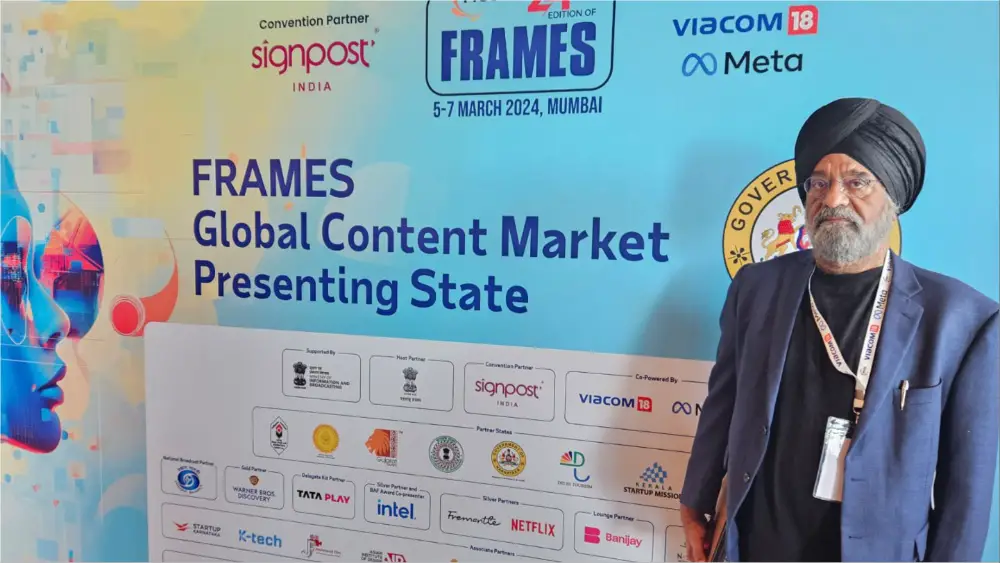The B2B meet-up at the annual Frames media conference in Mumbai has grown into a full-fledged global content market under the guidance of veteran producer Bobby Bedi.
Bedi’s credits include Shekhar Kapur’s global breakthrough film Bandit Queen (1994), Deepa Mehta’s controversial film Fire (1996), and the romantic drama starring Rani Mukerji. It includes some of the landmark titles of Indian cinema such as ‘Saathiya’ (2002) and Vishal. Bhardwaj’s Macbeth adaptation Maqbool (2003), Stanley Tong’s Jackie Chan-starrer The Myth (2005), Gurvinder Singh’s Rotterdam production Crescent Night (2002) ).
The market was booming from the start, with a significant number of Indian players as well as a strong international presence from the UK, South Korea, Turkey, Spain, Germany and Saudi Arabia. Bedi said the word “Asia” primarily suggests content from the Far East, and the frame market bridges the gap between content from South Asia and the Middle East. Distinguishing this market from the Indian government’s film bazaar in Goa, Bedi said that market is primarily part of film festivals attended by filmmakers, whereas in Mumbai, the capital of the Bollywood film industry, it is less commercial. He said he is focusing on. Frames is organized by Federation of Indian Chambers of Commerce and Industry (FICCI).
“Everyone is here [in Mumbai] We are only in the entertainment business. We don’t have any stars. These are people who come here because they want to learn something, or they want to communicate something, or they want to promote something,” Bedi said. variety. In addition to the Indian government, producers list companies that are supporting or sponsoring Frames, including Viacom18, Meta, Netflix, Fremantle, and Banijay.
“We are inviting people from the Red Sea Film Fund, who are seriously looking to include Indian content in 2025,” Bedi said. “The Middle East is a buyer for India. The Middle East has a huge population that comes from India, Pakistan and Bangladesh, so they are interested in products from here. I’m not looking.”
Bedi added that Spain’s leading delegation is also actively considering co-production with India, in addition to buying and selling on the market. Ulf Israel, the producer of 2024 Berlinale Prize winner Dying, was also a market participant.
Details of the transactions in the market have not yet been disclosed, but Bedi himself has made two transactions. He has signed a deal with a Saudi Arabian company to adapt one of his signature films in Arabic with a local author, which he describes as a “very big musical project.” It is something. “We believe that for entertainment to be successful in the Middle East, it has to come from the Middle East, not from the West or from here,” Bedi said.
This market has been praised by overseas participants. “It was great to return to FICCI Frames after over 10 years. As the only Indian market that covers both film and television, it was a great opportunity to learn about the current state of the Indian market and meet different Indian producers and storytellers. ,” said Lee Stone, partner at Lee & Thompson in the UK. variety. “Indian tax rebates are now available for Indian co-producers and foreign films shot in India, so more foreign co-producers, distributors and investors are interested in future FICCI frame market. We hope that more panels will be held between the Indian film and television production community and the rest of the world, including sessions on international distribution and how international film finance works. (and even workshops) aimed at bridging the gap. ”
Xavier Henry Rashid of distributor Film Republic said, “FICCI provides great insight into the rapidly changing Indian film scene and there are definitely several projects in the market. , we will keep a close eye on them,” he added. In addition to mainstream local productions, [independent] We are sending films to overseas markets, and I think this is a good place for filmmakers to develop these networks and international collaborators. ”
Wonsun Shin, a consultant based in South Korea, said, “We have a keen interest in trends in the global film industry and believe that the FICCI Frames Global Content Market 2024, which is a clear departure from traditional Bollywood norms, is a positive change. This is a welcome initiative.”
